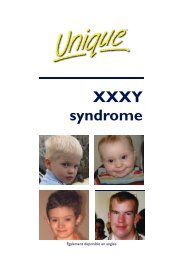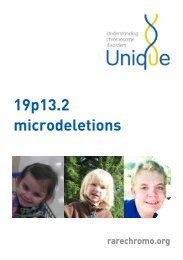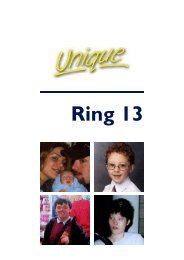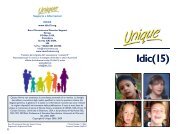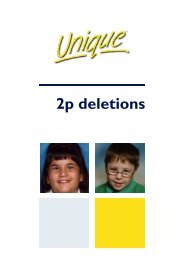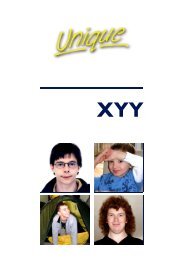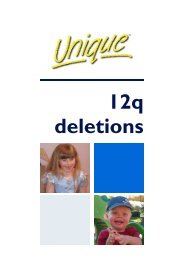Velo-Cardio- Facial Syndrome - Unique - The Rare Chromosome ...
Velo-Cardio- Facial Syndrome - Unique - The Rare Chromosome ...
Velo-Cardio- Facial Syndrome - Unique - The Rare Chromosome ...
Create successful ePaper yourself
Turn your PDF publications into a flip-book with our unique Google optimized e-Paper software.
and VPI can develop. VPI may be a structural problem (short palate), a functional<br />
problem (hypotonia of the velopharyngeal muscles), or a combination of the two.<br />
Sometimes the palate does not form correctly during development. This results in an<br />
opening in the roof of the mouth. Cleft lip occurs when the tissue that forms the upper<br />
lip does not fuse during prenatal development and is found only occasionally in VCFS.<br />
A cleft palate can contribute to the early feeding difficulties seen in children. At least 25<br />
per cent of people with VCFS have a bifid uvula (the uvula, the little V-shaped fleshy<br />
mass hanging from the back of the soft palate, is split).<br />
Babies with palate anomalies often have vomiting through the nose and later have<br />
hypernasal speech which makes it difficult for the child to be understood (see Speech<br />
page 9).<br />
• Immunity<br />
Many babies and children with VCFS often experience recurrent infections caused by<br />
problems with their immune system. In babies and young children the immune system is<br />
controlled by the thymus gland in the chest and sometimes this can be partially or<br />
completely absent or just not work well. Again the symptoms can be mild or severe.<br />
Often children are just more susceptible to colds and viral infections and fungal<br />
infections. Children who are frequently ill should have their immune system checked<br />
and those with a problem should be referred to an immunologist. Care should be taken<br />
with immunisations and live vaccines should be avoided in children with severe immune<br />
system problems. Most children improve with age, but some continue to be affected<br />
into later childhood and adulthood. Some children develop autoimmune diseases<br />
related to their immune deficiency, such as juvenile rheumatoid arthritis (which affects<br />
five <strong>Unique</strong> members), idiopathic thrombocytopenia (low platelet count), vitiligo<br />
(depigmentation of patches of skin) and Graves disease (an overactive thyroid) (Smith<br />
1998; Sullivan 1999; Davies 2001; Sullivan 2004; <strong>Unique</strong>).<br />
• Hypocalcaemia (calcium deficiency)<br />
Calcium is important to the body in the firing nerve endings and muscles. More than<br />
half of all children with VCFS have calcium levels within the normal range, however less<br />
than half of all children with VCFS are hypocalcaemic (low calcium levels). This may<br />
cause jitteriness or in severe cases seizures in young children, or muscle cramps or<br />
tingling of the mouth and fingers. As a result it is likely your baby‟s calcium levels will be<br />
monitored. This problem is caused by anomalies of the parathyroid gland which<br />
produces a hormone called parathyroid hormone (PTH). <strong>The</strong> low calcium levels usually<br />
resolve in infancy with most children outgrowing this problem by their first birthday,<br />
however, some children require calcium supplements for a longer period of time.<br />
Milder symptoms can be treated by a milky drink at bedtime. Recurrence of<br />
hypocalcaemia in later childhood has been reported during illness and/or puberty when<br />
medication may again be needed. It is unlikely that your child will develop<br />
hypocalcaemia in later childhood if they do not suffer from it as a small baby (Van den<br />
Bosch 2002; Repetto 2009; <strong>Unique</strong>).<br />
• Kidney and urinary tract<br />
Around a third of children with VCFS have differences in the way their kidneys are<br />
formed or how they work, such as a single or malformed kidney or kidney<br />
14



